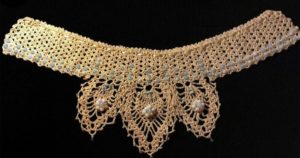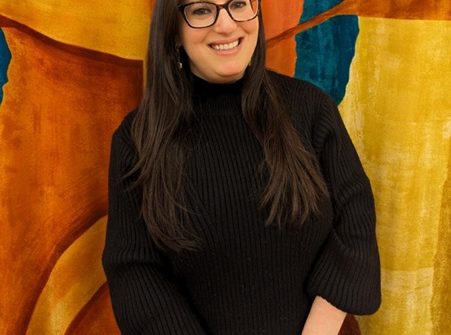Does anyone know what this is?

It is one of the famous collars of Supreme Court Judge Ruth Bader Ginsburg, who died on the eve of Rosh Hashanah almost 2 years ago. I didn’t know a lot about RBG as she has come to be known until PJ Library, an amazing monthly gift of a book for children up to the age of 8, shared her biography in a children’s book, entitled ‘I Dissent’. In this simple biography, we learn about an America where restaurants and hotels were able to display signs saying ‘No Dogs, No Coloureds, No Jews’. Ruth not only overcame the sting of prejudice she experienced as a child, and continued to fight against it for other communities throughout her career, but she overcame the assumed gender roles of her day too.
Ruth Bader Ginsburg was one of 9 women who graduated Columbia Law school in 1959. She came joint first in her year, and although there were 8 other women in the class, there were 500 men. All of the graduating women struggled to find posts after graduating. She was famously asked why she thought she deserved to take the place of a man. It became clear to Ginsburg early on that hard work, perfect grades and excelling beyond her male classmates wouldn’t be enough. She would have to change the system so that it worked the same for everyone. And her life’s work really was committed to making that happen.
Which brings me back to this lacy collar. RBG was famous for her collars, owning a range in her collection, from handmade gifts to jewellery pieces from Banana Republic, each collar carried a story. The story in this collar connects us to the piece of Torah we heard Harley read so confidently this morning. It was a gift commissioned for her by Moment Magazine when they presented her with their inaugural Human Right’s award. It is pretty hard to see, even from here, but woven into the lace in blue silk threads are the Hebrew letters tzadi, daled, kof – spelling Tzedek – justice. Just as we heard today – tzedek tzedek tirdof – justice justice shall you pursue! Justice Bader Ginsburg wore it on the opening day of the new U.S. Supreme Court term in 2019, a time of deep divisions, and certainly from her perspective, growing injustice in the US.
Her pursuit of justice for all could well be seen to be rooted in her Jewish upbringing. The Torah presents a model to us of how to create a judiciary that is beyond bias or bribe, that ensures sufficient credible witnesses are heard before harsh punishments are given, and that wanted justice to be available to all who needed it.
It was not a perfect system though, and as Bader Ginsburg knew only too well, change has to be fought for. Jewish law, for example, does not permit women to be full witnesses as men are. This has obviously changed in some parts of Judaism, while it has also been changing in society.
As a pioneering female law maker, another of RBG’s collars was made to honour her husband and two children. Marty Ginsburg met and married Ruth while they were at Law School. He too was a lawyer. But he was also a man ahead of his time, and in the 1960’s was happy to be the parent cooking dinner at home and do the school runs. The collar in honour of her family has embroidered into it a quote by Marty Ginsburg himself, an answer he gave to the many times he was asked if he was ok with all the sacrifices he had made for her career: ‘It’s not sacrifice, its family’. He said. And this simple modelling was another kind of justice. A justice that allowed both Ruth and Marty to enjoy fulfilling who they were as people, and enabled them to create a family together. Aretha Franklin and the Eurythmics sang the adage ‘Behind Every Great Man there has to be a Great Woman’. It turns out a great partner can be a man or a woman. In freeing ourselves from the assumptions of who should do what, we are all free-er to be who we can be.
Pursuing justice can be done in remarkable ways by incredible leaders like the late justice Bader Ginsburg. But it can also be done in a myriad small ways. By supporting, by listening, by seeing where change is possible in your own small part of the world, by raising others up to be whole in who they are.
The word Tzedek, justice, shares it’s root with tzedakah, a word we usually translate as charity. But our giving should be rooted in justice and creating equality and access for all. As we approach the High Holidays, a time traditionally associated with giving, we are asked by Torah to consider how our giving, our actions, and our life choices create greater justice in the world for all.
Tzedek Tzedek Tirdof, may we all be blessed with opportunities to be the bringers of justice, peace and wholeness to the world around us.
Shabbat Shalom



